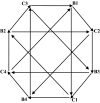Differential expression of virulence and stress fitness genes between Escherichia coli O157:H7 strains with clinical or bovine-biased genotypes
- PMID: 19880650
- PMCID: PMC2798638
- DOI: 10.1128/AEM.01666-09
Differential expression of virulence and stress fitness genes between Escherichia coli O157:H7 strains with clinical or bovine-biased genotypes
Abstract
Escherichia coli O157:H7 strains can be classified into different genotypes based on the presence of specific Shiga toxin-encoding bacteriophage insertion sites. Certain O157:H7 genotypes predominate among human clinical cases (clinical genotypes), while others are more frequently found in bovines (bovine-biased genotypes). To determine whether inherent differences in gene expression explain the variation in infectivity of these genotypes, we compared the expression patterns of clinical genotype 1 strains with those of bovine-biased genotype 5 strains using microarrays. Important O157:H7 virulence factors, including locus of enterocyte effacement genes, the enterohemolysin, and several pO157 genes, showed increased expression in the clinical versus bovine-biased genotypes. In contrast, genes essential for acid resistance (e.g., gadA, gadB, and gadC) and stress fitness were upregulated in bovine-biased genotype 5 strains. Increased expression of acid resistance genes was confirmed functionally using a model stomach assay, in which strains of bovine-biased genotype 5 had a 2-fold-higher survival rate than strains of clinical genotype 1. Overall, these results suggest that the increased prevalence of O157:H7 illness caused by clinical genotype 1 strains is due in part to the overexpression of key virulence genes. The bovine-biased genotype 5 strains, however, are more resistant to adverse environmental conditions, a characteristic that likely facilitates O157:H7 colonization of bovines.
Figures




References
-
- Aldick, T., M. Bielaszewska, W. Zhang, J. Brockmeyer, H. Schmidt, A. W. Friedrich, K. S. Kim, M. A. Schmidt, and H. Karch. 2007. Hemolysin from Shiga toxin-negative Escherichia coli O26 strains injures microvascular endothelium. Microbes Infect. 9:282-290. - PubMed
-
- Bergholz, T. M., and T. S. Whittam. 2007. Variation in acid resistance among enterohaemorrhagic Escherichia coli in a simulated gastric environment. J. Appl. Microbiol. 102:352-362. - PubMed
Publication types
MeSH terms
Substances
Associated data
- Actions
Grants and funding
LinkOut - more resources
Full Text Sources
Medical
Molecular Biology Databases

